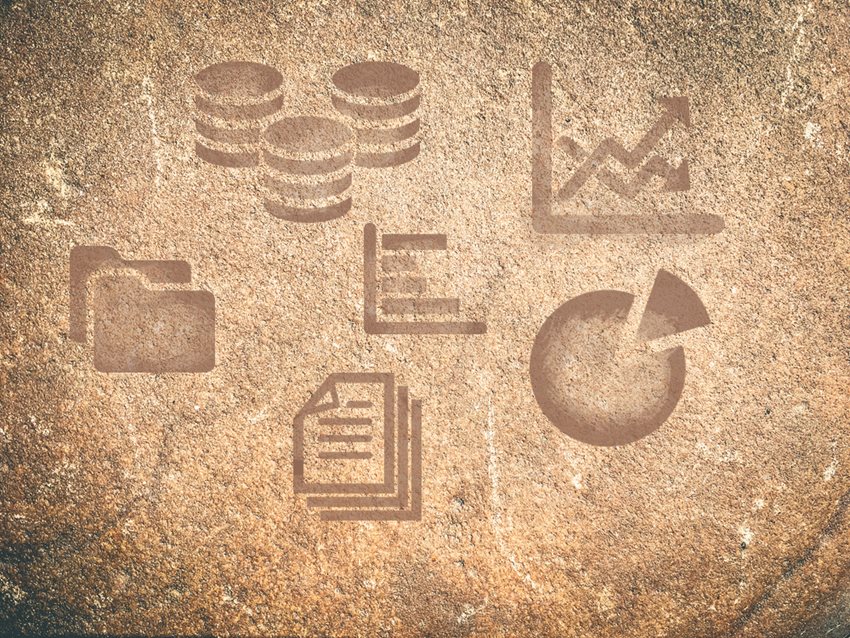
I’ve been thinking a lot recently about remnants in language — speech patterns and phrases we still use long after we have forgotten their original purpose. (You guessed it: my studies on the formation and change of human language are still going strong.)
We repeat the same phrases without any real understanding of their original meaning. You might describe a cruel individual as "ruthless", even though the word "ruth" has fallen out of common parlance. Somehow these things live on despite their original use having been lost. Like junk DNA … or the appendix.
This made me think about historical remnants that live on today within data management.
Remnants in data management? How did that happen?
Remember those heady days when physical tape was the de facto standard medium for data transfer? What about when we had to use obtuse, condensed binary formats to make our data fit onto any available tape or file system.
The data was just too large to do anything else with it. All we ever did with that data was load it into software bought from a service company.
How did companies let this happen? Why was it okay to give away access to the data, to let it be controlled by service companies? If you see value in this data (and you certainly pay enough to acquire it), why not retain the ability to read it?
Parsing the problem
For the last few days I have been writing a parser for DLIS files — log files created by sensors used to monitor petroleum wells. Yes, seriously.
In the oil industry, we have a standard that we use for some really important — and really expensive — log data from wells. That standard is not very easy to read.
The DLIS format — stuck in 1991 as it is — is the digital embodiment of a hangover from a less technologically capable time. Technically, it is an open industry standard, officially owned by Energistics. The only documentation that seems to exist is the original RPC66 V1 documentation, which is far from easy to understand. As far as I can see, an open-source parser for this format is not readily available. In essence, you have to pay someone in order to read these files.
So why am I writing a DLIS parser? Well, somebody has to do it! I'm trying to create a petrophysics data management solution based on new paradigms — open-source software, big data technologies, repeatable data pipelines — and I would argue that DLIS is an important format to include.
“We don’t have to resort to the old rulebook”
Throughout the project, I continually remind myself that we don’t have to resort to the old rulebook: to follow remnants of the past that make little sense any more.
On reflection, it's perfectly adequate to translate this data to an ASCII format and to make it self-describing. Yes, the files will be larger, but so too are hard drives these days. The benefits far outweigh the storage cost: open access, the ability to index and search the data, the ability to use existing tools to manipulate the data. The list goes on…
We need to think about why we do what we do, and whether it still makes sense in today's world. If our actions no longer make sense, point it out to other people, and, most importantly, adapt.
Have you got relics in your data management? Shout about it by sharing this article — or even write your own (and drop me a link). You can also get in touch with me if you have similar data management challenges. I’d love to hear from you!
Oh, and if you happen to have source code for parsing DLIS files that you are willing to share with the world, I would very much like you to let me know.
Originally from an IT background, Jane McConnell specialised in Oil & Gas with its specific information management needs back in 2000, and has been developing product, implementing solutions, consulting, blogging and presenting in this area since.
Jane has done time with the dominant market players – Landmark and Schlumberger - in R&D, product management, consulting, and sales - before joining Teradata in 2012. In one role or another, she has influenced information management projects for most major oil companies across Europe. She chaired the Education Committee for the European oil industry data management group ECIM, has written for Forbes, and regularly presents internationally at Oil Industry events.
As Practice Partner for Oil and Gas within Teradata’s Industrial IoT group, Jane is focused on working with Oil and Gas clients across the international region to show how analytics can provide strategic advantage, and business benefits in the multi-millions. Jane is also a member of Teradata’s IoT core team, setting the strategy and positioning for Teradata’s IoT offerings, and works closely with Teradata Labs to influence development of products and services for the Industrial space.
Jane holds a BEng in Information Systems Engineering from Heriot-Watt University, UK. She is Scottish, and has a stereotypical love of single malt whisky.
View all posts by Jane McConnell